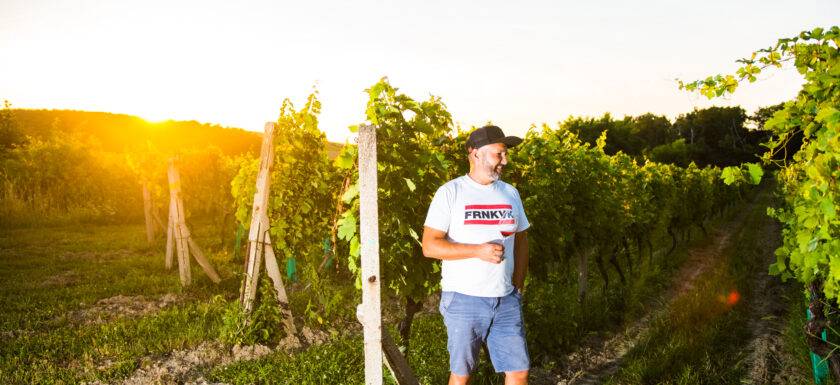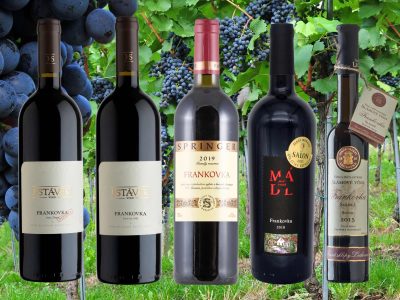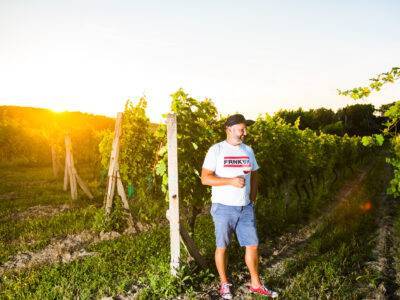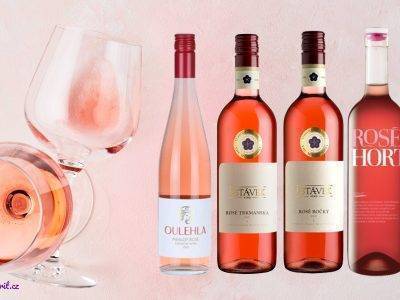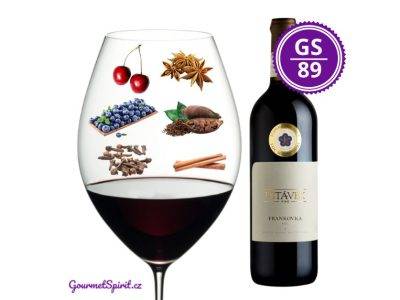Jan Stávek is a modest and educated winemaker who is one of the leading figures in Moravian winemaking. He is the chairman of the association V.O.C. Modré Hory (Blue Mountains). The profile variety of his Víno J. Stávek winery is Frankovka (Blaufränkisch), which he offers in many styles – from non-alcoholic must and verjus, through white wine Blanc de Noirs to complex Reserva. It is also a pioneer of matured rosé and fortified, liqueur and flavoured wines in the Czech Republic. Jan patiently guided us through his vineyards and cellar and answered our questions engagingly. A very pleasant conversation and tasting lasted until the late hours. We managed to discuss some topics really thoroughly, so we actually collected material for several interviews.
I have become a winemaker by accident ...I only realized that we had built a wine company when we won the title of Winery of the Year.
-
Zboží zasíláme v krabici pro 6 lahví . Z toho důvodu je nutné celkově objednat vždy alespoň 6 lahví k dokončení objednávky.
Lze nakombinovat i různé láhve.
Jen tak jsme schopni 100% garantovat bezpečné doručení křehkých skleněných lahví do Vašich rukou. Děkujeme.
Honza, what is your first life memory of wine?
The oldest memory, which I like very much, is of my grandfather Jožka Stávek, holding the small glass of his Večerka in his powerful hands and caressing mischievously. My father’s wine cellar was an ordinary thing for me, but it was different with my grandfather. I still remember his skilled hands and his cellar with wooden barrels.
Grandfather also made so-called children’s wine, when he stopped fermentation at 1-2% alcohol. He then heavily sulphured the wine. This wine, which he gave us, the little ones, to taste, reeked of sulphur. It was my first wine. We must have had a headache.
When did you actually realize you wanted to be a winemaker?
Until I studied environmental chemistry at university in Olomouc, I didn’t really take my heels out of the local area. I also studied high school in nearby Hustopeče. Suddenly I came to Olomouc – a big student city. As a freshman, I was in the dorms with doctors and lawyers who were already slowly finishing their studies. In the dorms, I initially gave our 2-3 wine samples to taste. It gradually evolved into regular Wednesday tastings. Every week I was carrying more and more wines. At that time, I enjoyed listening to older students the most. I realised that I actually know something about wine. Until then I thought I had no interest in wine at all. Gradually, I began to study more about it in order to say something new every week for the next tasting. I found the world of wine to be very cool. That’s when I realised that it would be a huge shame not to continue the family wine tradition started by my great grandfather.
As a 20-year-old, I was bolder.
Today, when I taste my wines of that time in the technological archive,
so I wonder what wines I had the courage to go out into the world with.
I actually don't know whether to laugh or cry.
How did you become the winemaker we know today? Where and how did you gather your oenological experience? What shaped you?
In my opinion, one becomes a winemaker only after several years of own production. My first wine products (not even wine) were laughable. Still, I naturally didn’t listen to what my father advised me to do. On the contrary, I respected my grandfather’s advice more. For me, wine growing was just a hobby all my life, which gradually developed into a business.
Immediately after completing my university studies in Olomouc, I threw myself into studying winemaking in Lednice. During my studies, I had a lot of time to start cultivating and building a small business on the grounds and premises of the Vinařský dvůr. I started gradually buying land and tracks. After completing my doctoral studies, everything took a turn – I invested in cutting-edge technologies. We gradually became a truly professional winery. However, I only realized that we had built a wine company when we won the title of Winery of the Year (note GourmetSpirit: in 2017).
Until I finished my university studies, winemaking did not support me. It was always a hobby of mine. I had a part-time job at school. I have never had to make wines that have to be sold. I had amazing creative freedom. This is how my fortified wines and rosé were created.
Of course, I gained a lot of inspiration and experience from foreign internships. For example, something that works in Australia may not work here. I have touched many of our new technologies. For example, I think I was the first in our country to use cryomaceration, which was a common method in Zealand and Australia. Half of our winemakers now use cryomaceration, which is great (note GourmetSpirit: cryomaceration increases the aroma and adds tannins).
You have gained winemaking experience on all continents. But the closest thing to you is the Iberian Peninsula. Why?
Yes, I have basically visited all the major wine regions of the world. That is, strangely enough, with the exception of France, whose rules seem confusing to me. At the age of 19, I hitchhiked around the Iberian Peninsula, mainly Portugal. In the past, I was also very interested in the creation of fortified wines, I also wrote a book about fortified wines, so as part of a grant from the Portuguese embassy, I visited several meccas of fortified wines – Portugal (Douro) and Spain (Jerez). These two wine countries are very close to me. The Portuguese are actually such Moravians – warm, hardworking, ordinary and hospitable people. I think Portuguese wines are very underrated. Out of all of Europe, I like Portugal the most.
What wine do you consider to be the best you have ever tasted and what impressed you about it?
Sauvignon Sonne, I think 2006, by Franz Strohmeier from Styria. I have never drunk anything more concentrated and soft at the same time in my life.
What is the production mix of individual styles of your winery in recent years?
40% red, 30% white, 20% rosé and 10% fortified, including vermouth.
What do you think makes your wines unique in Moravia and in a global context?
I think that my wines are not really unique. I try to make wines that are regionally typical. I do not make wines in the price range of several thousand crowns per bottle. These are wines for 240 – 700 CZK, and there is nothing unique about that. On the other hand, I think that our Frankovka from the Blue Mountains (Modré hory) are original. They feature some trace of sour cherry, a line that runs alongside the spiciness and herbal note.
Perhaps from a global perspective it even looks a little better. Frankovka is essentially only a Central European affair: it is grown in the Czech Republic, Austria, Hungary, Slovakia and a little in Germany, Slovenia, only in one winery in Australia, and in one in Spain. In any case, I have no ambitions to create unique wines.
How much are you successful in exporting your wines and possibly where?
We mainly specialize in Great Britain, Canada, Hong Kong, South Korea, the USA, Germany, Poland and, of course, Slovakia. Our exports are growing without me actively trying to do so. Until 4 years ago, we practically did not export at all. Primarily successful in exporting rosé, especially Bočky. It seems that the world is more open to “other” technologies, which is evident in mature rosé. We manage to export in such a way as to simultaneously satisfy the domestic market, which is a priority for me.
Why do you think that a certain style of Moravian or Czech wines is not gaining ground in the world, but rather individual winemaking? And do we actually have a style?
I think we don’t really have a style because we don’t focus on one, two or four varieties. The only thing that can characterize Moravian wines is a fruity character, high aromatics and freshness due to high acidity. The diversity of our wines is not a style, quite the contrary. Otherwise, we don’t have another link, and that’s why it’s hard for us to establish ourselves in the world. Lately, winemakers who focus on so-called natural wines, which are something special, have been gaining ground. Some Western European wine lovers began to look for natural wines from Central Europe. I do not think that this is completely satisfactory, because it does not give a credible picture of the wines of the Czech Republic.
In the past, you could count Moravian winemakers who made good red wines on the fingers of one hand. This is definitely not the case today.
Your vineyard is located in the warmest and sunniest parts of the Czech Republic. Nevertheless, for high-quality ripened blue grapes in our conditions, a lot has to be sacrificed. What would you say to Jiri Hort, who for economic reasons decided to grow blue grapes in France rather than produce Moravian red wines.
I do not think that there is a need for large sacrifices in selected locations. Jirka Hort has a hard time when she doesn’t have her vineyards. No one will sell him quality blue grapes. It is difficult to make wine without a vineyard. Perhaps he would have spoken differently if he had grown wine in Velke Pavlovice sub-region. But that’s nothing against him. He is an excellent technologist and has his own specific style of wines. It’s the easier way. We all have a different one. I manage to sell red wines well.
In the Czech Republic, the Germanic wine classification system rules.
For many, the variety and sugar content are simply more important than the location.
That is the biggest evil. I don't care how much sugar a grape has.
It is important to collect it so that it is at an ideal maturity. Sufficient sugars, but also acids, extract and, of course, mature tannins in the case of blue grapes.
You are the chairman of VOC Modré Hory (Blue Mountains). What is your opinion on VOC in general?
Unfortunately, some VOCs try to sell everything under this mark. It’s not just about the number of varieties in each VOC, but rather the approach. This is not the right direction. For this, we still have a functioning Germanic system, where the sugar content of the grapes is sufficient. But the real originality is hidden in the combination of choosing a suitable variety, or clone, for the given locality and subsequent processing with a uniform or at least very similar technology. In this way, the regional specificity that everyone craves is achieved. The point is that each VOC really offers consumers a specific style of wine. The Germanic way of classification then naturally disappears. E.g. VOC Znojmo offers rather fresh wines. Here in the Blue Mountains, we strive for Frankovka with a gentle touch of oak barrel. Yes, Modrý Portugal and St. Laurent (Svatovařinecké) are still allowed within our VOC, but they only represent about 20%. In the Blue Mountains, Frankovka is the main player.
I hope that with the change in the leadership of the Union of Winemakers, there will also be more pressure for the creation of a real apelation system. But the winemakers must also have the will. It is important that winegrowers look beyond their village and respect the “terroir” of their colleagues in other villages. I am proud of the excellent tracks in Němčičky, but of course I also appreciate the tracks in Kurdějov, Kraví Hora, Bavory and other municipalities. I think Vladimír Železný once said: “The appeals system will never be created in the Czech Republic, because we don’t have either totality or monarchy. On the contrary, we have too much democracy.” We probably have no choice but to order an appeal system from above.
I like that many young winemakers go the "natural" way.
The problem is that many of them have no winemaking experience.
This must naturally have a negative effect on the long-term quality of the wines.
What is your opinion on biodynamic procedures, when aspects of philosophy and cosmology according to Rudolf Steiner and Marie Thun are involved?
I have a very positive attitude towards these procedures. I use some of them – not so much the cosmological ones, but rather the ones built on a real basis. Unfortunately, I am very influenced by science and research during my PhD studies. I work with herbal preparations. I make my own compost, which I put back into the vineyard and this ensures a certain natural cycle. On the contrary, I can’t yet work with the phases of the moon, because I make 40,000 and not 5,000 liters of wine.
For me, natural wines are a pleasant revival of the market. On the other hand, they are more similar to each other than so-called conventional wines. Do you agree? What do you think it is?
Yes it’s right. A natural winemaker does not have so many technological possibilities. Natural wines are actually all produced the same – neutral or autochthonous yeast, on yeast, with a minimum of sulphur, or some even on skins. It is not even possible to shape the aroma of the wine in any way. It is important that these are pure, flawless wines, which is a problem for some so-called natural winemakers.
The term terroir, i.e. the set of climatic and soil conditions combined with the approach of the winemaker, is used a lot by winemakers and top wines. How can it be recognised in wine?
It is ideal if the winemaker let you taste 10 vintages of a certain wine from the same vineyard. Only then are you able to recognise the terroir. In my opinion, a taster who drinks a certain wine for the first time and calls it a great “terroir wine” has no idea what he is talking about. Especially if he has never been to that particular vineyard.
What is your opinion on pairing wine with food?
It’s a shame that most Czech families see wine as a festive affair. In my opinion, wine should always be in the wine cellar, fridge or pantry. Wine should accompany food at the family table every day. First, the acids and tannins in wine support digestion. Second, 1+1=6. Although there are no rules when it comes to pairing food with wine, some combinations go well. For example, the ideal dish to go with our Frankovka is neck meat with mushrooms.
We often organize tasting menus with different restaurants. I like it when I send the sommelier 6 bottles and he and the chef prepare the perfect meal because I don’t change the wine anymore. Of course, sometimes I have to pair my wines with an already prepared menu, which is not ideal.
You continue the tradition of family winemaking. Winery is a long shot. What are the prospects for continuing the family tradition?
It looks good. I have two sons and a daughter, so maybe one of them will take over from me.
What are your winemaking ambitions? What is your winemaking goal?
My main goal is not to get stuck and not to slack off. I plan to plant more vineyards, but at the same time I don’t want to increase the production above the current 40,000 bottles. Our cellar is designed for this capacity. So I plan to keep only the best locations and sell the rest. I also plan to focus more on sparkling wines. In addition to the Sexta rose sparkling wine, I want to start producing Blanc de Blanc as well. I still enjoy the winery, and that’s the most important thing. I’m glad that someone other than me likes my wines, even though some wines are very specific.
